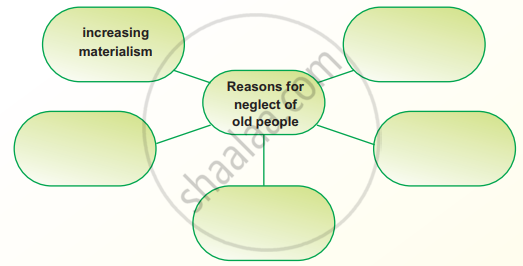Advertisements
Advertisements
Question
Answer the following in detail:
Bring out the irony in the title of the play.
Solution
The title of the play ‘The Dear Departed’ literally means that somebody dear has departed/ died and is no more with us. It makes everyone closely connected with the departed person sad and upset. Everyone is at a loss and tries to cope up with the situation. In this case, the title is ironical because nobody in the family loved grandfather. He was dear to no one. They all are relieved that he is no more. They talk of everything from mourning outfit to what all he has left behind but nobody is in a hurry to even go and see him. He is supposed to be dead and lying in his room. They all decide to have tea, discuss the obituary that should go in the newspapers but no one either has tears in his/ her eyes or is missing the grandfather. They are very businesslike and their business seems to be what each one of them will get now that the old man is dead. In no way was he ‘dear’ to his daughters or their husbands. Mrs Jordan had not even visited her father in the last three years since the time he had moved to Mrs Slater’s home. So much for a dear father! If she was there today, it was to show off in the society and to ensure that she gets her share of whatever he has left behind. Ironical, isn’t it?
APPEARS IN
RELATED QUESTIONS
Read the news story given below.
|
India's elderly face growing neglect Traditionally older people have been revered in India, signified by the touching |
Discuss in groups:
a) What are the reasons for the old people being "abused, harassed and
abandoned" in India?
b) What are the problems faced by the old people as a result?

Answer the following question briefly.
How does Mrs. Slater plan to outshine the Jordans? What does it reveal about her character?
Answer the following question briefly.
Why does Mrs. Slater decide to shift the bureau from grandfather's room before the arrival of the Jordans? How does Henry react to the suggestion?
Answer the following question briefly
What does Mrs. Jordan describe as 'a fatal mistake'? What is the irony in the comment she makes on Mrs. Slater's defense?
Answer the following question briefly.
Ben appreciates grandfather saying 'its' a good thing he did'. Later he calls him a 'drunken old beggar'. Why does he change his opinion about grandfather?
Answer the following question briefly.
What are the three things that grandfather plans to do on Monday next?
Answer the following in detail:
How does the spat between his daughters lead to grandfather discovering the truth?
Answer the following with reference to the context.
"Are we pinching it before Aunt Elizabeth comes?"
a) What does 'it' refer to here?
b) How does Vicky conclude that her parents are 'pinching it'?
c) Mention the two reasons that Mrs. Slater gives for her action.
d) What does it reveal about the difference between the attitude of the elders and that of Vicky?
Answer the following with reference to the context.
"Now, Amelia, you mustn't give way. We've all got to die some time or other. It might have been worse."
b) Who is the speaker of these lines?
c) What prompts the speaker to say these words?
d) What does he mean when he says 'It might have been worse'?
e) What does it reveal about the speaker's character?
Grandfather says, "It seems to me that neither of you has any cause to feel proud about
the way you've treated me.'' While it is true that the daughters disregard modesty,
decency and filial obligation, grandfather cannot be fully justified in practically
disowning his family. Besides, Victoria loves him and he seems to have spared no
thought for her feelings.
Divide yourselves into groups of four or five and discuss the statement: Grandfather is not entirely right in moving away from his daughters.
After the discussion, a representative from each group will present the views of her/ his group to the class in about 3 minutes.
